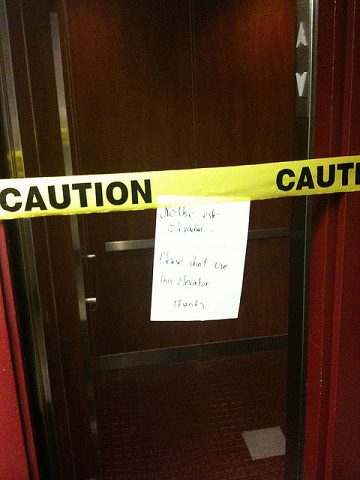 Our school elevator was finally replaced. It’d been unreliable for over a decade now – breaking down regularly, making suspect noises even when working, and generally scaring off all but the neediest passengers… of which there were still quite a few.
Our school elevator was finally replaced. It’d been unreliable for over a decade now – breaking down regularly, making suspect noises even when working, and generally scaring off all but the neediest passengers… of which there were still quite a few.
It took years of analyzing and advocating, months of allocating and approving, weeks of R.Q.-ing and P.O.-ing – but eventually actual work could be done. While the replacement wasn’t entirely NEW, it was DIFFERENT. It went up and down with some consistency. The buttons even lit up when you pushed them!
That is, until yesterday. When school started. It stopped and wouldn’t go no more. Period.
In the midst of the chaos of the new school year, some of the most capable and over-qualified administrators in the state had to stop and figure out how to accommodate a dozen students and staff who for various reasons absolutely rely on the elevator to get from floor to floor.
Turns out it’s not ‘broken,’ exactly.
Internal sensors detected the lack of a required safety switch – several weeks into actual usage – and shut it down.
The switch is thousands of dollars – money NOT discussed, allocated, approved, R.Q.-ed, or P.O.-ed. And, thanks to the intricacies of state law, county codes, local regulations, district policies, bid processes, contract specifications, and a half-dozen other layers of red tape, no one is actually responsible in any way for whether or not the switch exists or the elevator actually works.
So the process begins – the discussions, the fiscal juggling, etc. Phone time. Emails. Best case, the first several stages are ready for approval by the next monthly board meeting.
It will get fixed, eventually. Kids will miss classes and employees will waive their rights under ADA, but one day it WILL elevate again. What can’t be recovered are the man hours and lost focus spent on something that (a) shouldn’t have happened, and (b) no one person or group has the power to prevent – meaning there’s also no accountability.
The system is all-powerful.
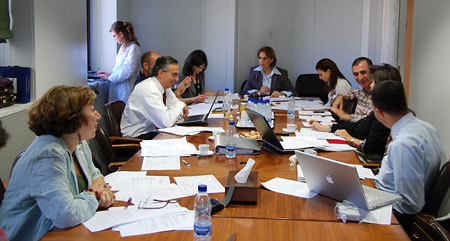 Several years ago, I was on a committee in a state which shall remain nameless, during a phase in which Common Core was going to save us all. (This was a few short years before Common Core was going to destroy us all.)
Several years ago, I was on a committee in a state which shall remain nameless, during a phase in which Common Core was going to save us all. (This was a few short years before Common Core was going to destroy us all.)
The goal was to revamp state curriculum to make room for the time-intensive skill-building advocated by He-Who-Must-Not-Be-Named. It was (correctly) presumed that we could not maintain our already bloated content standards AND expect teachers to legitimately commit to the kind of analytical reading and evidentiary writing called for under the new priorities.
We gathered in an atmosphere of revolution. Renewal. This was it – nothing was sacred! Old things had passed away; all things curricular would become new!
As various overhauls were proposed, it was revealed that the state had already invested zillions of dollars in the test bank from which the various high stakes exams are assembled. Creating new ones would require months of writing, more months of review, seven layers of approval and revision by thousands of stakeholders, costing millions of dollars, and culminating in the sacrifice of several newborns and a red-headed virgin to a deity named ‘Zuul’.
In short, overhaul the entire curriculum – as long as the state could still use the same test questions at the same grade levels.
No one in charge saw this as particularly limiting; in their world such neutering of all hope was the norm. They were bewildered at the Negative Nancies who saw this as more than a minor inconvenience – a feature, more than a frustration. Let’s keep a positive attitude! Enough nitpicking – let’s get started!
By the time we’d wrestled for two and a half days culling the content standards, they’d grown by roughly half-a-page per grade level. THEN we added the Common Core standards. They, at least, are still there – although under more rhetorically friendly headings.
It was proclaimed an amazing victory and a huge improvement thanks to the hard work and radical rethinking done by all.
The resources and man-hours invested to make everything mostly-the-same-but-slightly-worse (a) shouldn’t have happened, and (b) can’t be fairly blamed on any one person or department. No one may be held genuinely accountable.
The system is all-powerful.
Last one. I promise.
 My district is in dire need of qualified teachers of color. Most districts are. The state has expressed a similar concern, along with bewilderment about what could possibly be done. It’s a subject of much discussion and some emotion.
My district is in dire need of qualified teachers of color. Most districts are. The state has expressed a similar concern, along with bewilderment about what could possibly be done. It’s a subject of much discussion and some emotion.
I had a paraprofessional for one of my low-performing classes last year. Strong Black male. Great mindset towards education and towards kids. Street savvy enough to have credibility with those so-inclined, but professional enough to pull kids of all colors and backgrounds into the light with his strong personality, his obvious love for them and for learning, and his lack of pretense.
His content knowledge was workable, and growing. I wasn’t worried – most of us learn our subject matter best by teaching it. Besides, for the kids with whom he was having the most dramatic impact, the ability to analyze technological improvements during the Civil War or cite from memory major cases involving the Establishment Clause wasn’t really a priority.
He took his certification test and fell short – but not by much. No worries… he’d do better next time. Another season of study and preparation and hustle, above and beyond the time spent in school all day, with family at home, and working his two other jobs – because this, he believed, was his calling. These were his kids.
He took the state test again and missed certification by one point.
A few phone calls put him in touch with some dear lady at the State Department who explained that the computer software which graded his essays didn’t like how often he’d repeated certain words and that he hadn’t varied his vocabulary or some such thing. She encouraged him to try again.
He moved on.
I’m not suggesting we lower our standards, but a person didn’t reject him by a point – an algorithm did. I’m guessing it didn’t factor in our desperate need for strong teachers of color, intelligence, and the ability to reach kids… even if they don’t write quite whitely enough for the software developers as they change those lives.
Losing him was completely unnecessary. It (a) shouldn’t have happened, and yet (b) no one person or office could have circumvented the bureaucracy involved even had they wished.
The system is all-powerful.
 Why, with the hundreds of studies, books, charters, and breakthroughs, can’t we change anything of substance in public education? Why can’t we implement even those things widely acknowledged to be good for kids?
Why, with the hundreds of studies, books, charters, and breakthroughs, can’t we change anything of substance in public education? Why can’t we implement even those things widely acknowledged to be good for kids?
Why is it, with all the talk, the rallying, the hand-wringing, and the bluster, nothing seems to fundamentally evolve?
There are multiple factors – some personal, some logistical, and many economic. But chief among them, I belligerently suggest, is the maze of paperwork and policies on a dozen levels which make it impossible for anyone to simply DO anything useful. No one’s in charge, therefore no one’s capable… or accountable.
The nightmare of red tape purported to prevent anyone from doing anything bad, anytime anywhere, is far more effective at preventing us from being particularly helpful. It’s against the rules. The one thing at which bureaucracy excels is perpetuating and growing itself to the expense of all else.
We are smothered in procedure and policy so tangled as to preclude substantive progress. Unless we find the will and the means to destroy the roots of this systemic kudzu, our continued efforts to prune or pretty up the results will continue to be futile.
The elevator is broken.
RELATED POST: Obedience School
RELATED POST: #EdReform Is NOT That Difficult!






 I’m a fairly narcissistic fellow. I don’t mean to be, it’s just that I’m vain and self-absorbed. At least I have the skills, style, and cojones to make it work for me. I make no apologies; every rose has it’s – oh, are you still here? I hadn’t noticed.
I’m a fairly narcissistic fellow. I don’t mean to be, it’s just that I’m vain and self-absorbed. At least I have the skills, style, and cojones to make it work for me. I make no apologies; every rose has it’s – oh, are you still here? I hadn’t noticed. I’m pretty entertaining, and I have a degree. That should buy me some leeway, yes?
I’m pretty entertaining, and I have a degree. That should buy me some leeway, yes?
 Which, by the way, is pretty much what many of you keep telling me about my teaching methods. You know – if I were doing it right, I wouldn’t have to work so hard to coerce and browbeat them… like you’re doing to us?
Which, by the way, is pretty much what many of you keep telling me about my teaching methods. You know – if I were doing it right, I wouldn’t have to work so hard to coerce and browbeat them… like you’re doing to us? When I’m in my classroom, my number one ethical and professional obligation has absolutely nothing to do with your studies, your strategies, and sure as hell not your tests – mandated or not. I’ll certainly consider the input of my department and my building leadership, but even those should take a back seat to what I think and feel and believe will be best for MY kids, today, right now.
When I’m in my classroom, my number one ethical and professional obligation has absolutely nothing to do with your studies, your strategies, and sure as hell not your tests – mandated or not. I’ll certainly consider the input of my department and my building leadership, but even those should take a back seat to what I think and feel and believe will be best for MY kids, today, right now. We’ve become SO comfortable doing things we know are bad for our kids because they’re ‘required’. Maybe we’re afraid, or maybe we simply hide behind what everyone else is doing. Is this such a rewarding career in terms of money, power, and glory, that we’ll sacrificing the very things that made it matter to begin with in order to keep it secure? Must be a helluva extra duty stipend.
We’ve become SO comfortable doing things we know are bad for our kids because they’re ‘required’. Maybe we’re afraid, or maybe we simply hide behind what everyone else is doing. Is this such a rewarding career in terms of money, power, and glory, that we’ll sacrificing the very things that made it matter to begin with in order to keep it secure? Must be a helluva extra duty stipend. 


 You’re not entirely wrong. Few of us, teachers or no, like change or higher demands on our time and energy – especially when they come from people who have no idea what we do or what they’re talking about.
You’re not entirely wrong. Few of us, teachers or no, like change or higher demands on our time and energy – especially when they come from people who have no idea what we do or what they’re talking about. 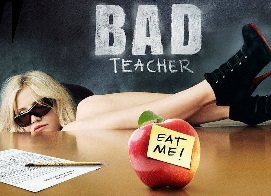 The only way VAM and TLE and other teacher evaluation measurements make any sense or improve anything is if they spur teachers to do a better job. If teachers are capable of doing something better, and aren’t doing it now, the only reasonable inference is that they don’t care enough to improve otherwise.
The only way VAM and TLE and other teacher evaluation measurements make any sense or improve anything is if they spur teachers to do a better job. If teachers are capable of doing something better, and aren’t doing it now, the only reasonable inference is that they don’t care enough to improve otherwise. 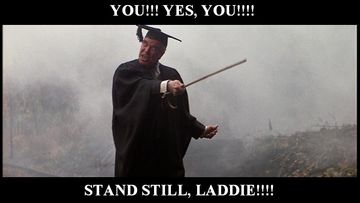 If the solution is ‘raising the bar’ for those entering the classroom, then the problem must be that those choosing education aren’t smart enough to do what they’re hired to do. If that’s true, it’s worth asking what would be useful in drawing ‘smarter’ people into the field – or how to better educate those already willing.
If the solution is ‘raising the bar’ for those entering the classroom, then the problem must be that those choosing education aren’t smart enough to do what they’re hired to do. If that’s true, it’s worth asking what would be useful in drawing ‘smarter’ people into the field – or how to better educate those already willing.  No one wants this job.
No one wants this job.
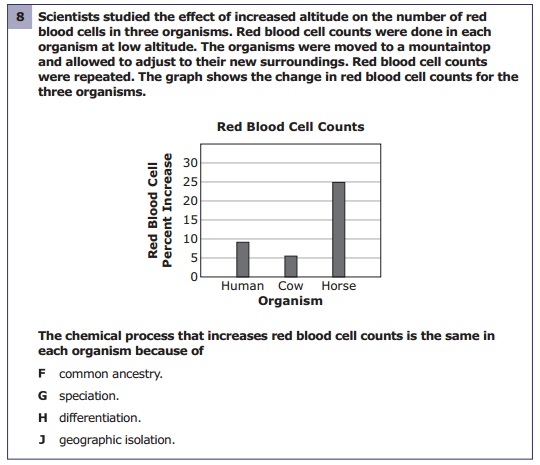


 We can’t vary the curriculum significantly – state law. We can’t afford meaningful, hands-on learning of the sort you keep reading we should be doing, nor can we spare ‘core curriculum’ time to do anything interesting that kids might actually want to explore (and on which we could then build essential universals, like reading and writing and mathematical reasoning) – state law and legislative purse strings.
We can’t vary the curriculum significantly – state law. We can’t afford meaningful, hands-on learning of the sort you keep reading we should be doing, nor can we spare ‘core curriculum’ time to do anything interesting that kids might actually want to explore (and on which we could then build essential universals, like reading and writing and mathematical reasoning) – state law and legislative purse strings. 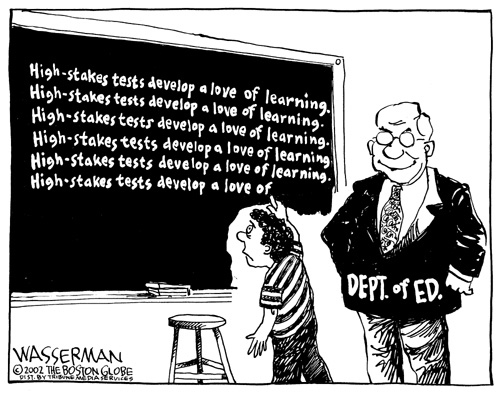 We can’t hold kids with the most potential to real academic standards or expectations of personal responsibility – angry parents, strange cultural ideals about the need to have 102% in everything and never struggle or fail, and administrators who are under a lot of pressure to show that every single child in the district is Top 10%.
We can’t hold kids with the most potential to real academic standards or expectations of personal responsibility – angry parents, strange cultural ideals about the need to have 102% in everything and never struggle or fail, and administrators who are under a lot of pressure to show that every single child in the district is Top 10%. 